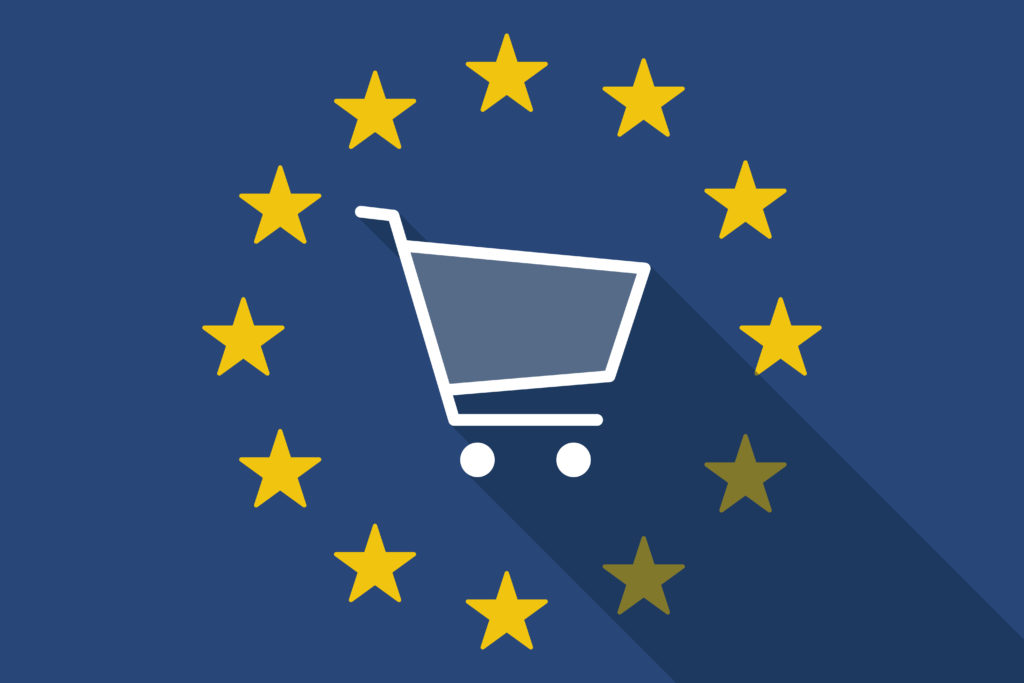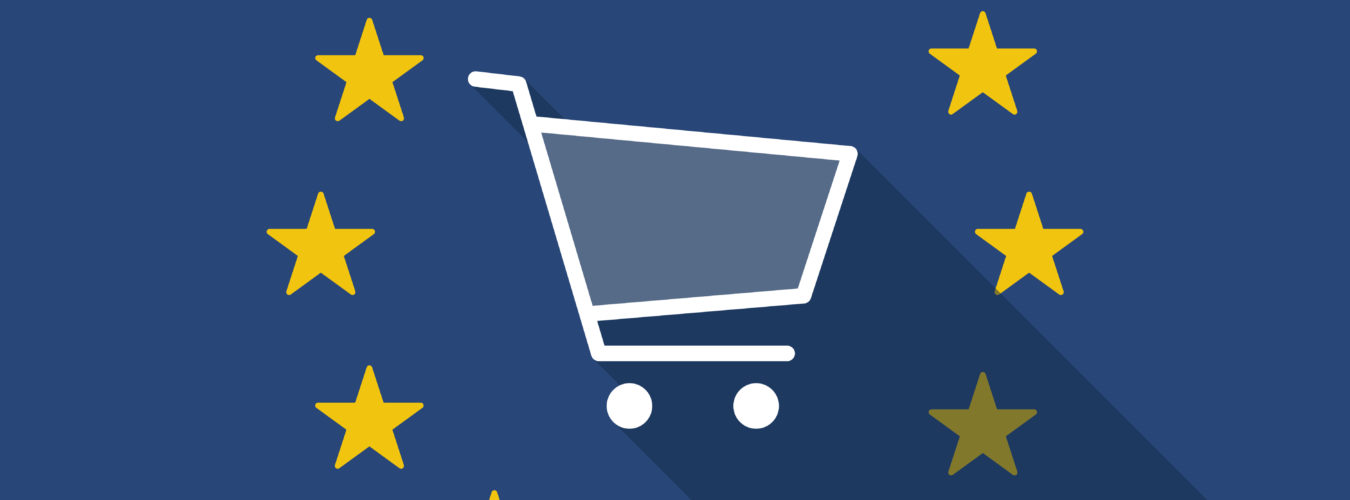5 July 2021
In essence, the changes mean all supplies of goods and most supplies of services to EU consumers purchased via e-commerce are to be taxed where the consumer is located in the EU.

This obviously has major obligatory, administrative and cost considerations for businesses if not managed carefully.
So to minimise the burden and aid compliance, The EU has introduced a number of measures as part of the reforms.
These include:
- The launch of a One-Stop Shop (OSS) EU VAT return – eligible businesses can register with just one EU tax authority to manage their VAT obligations across the bloc. This means they will essentially submit a single EU VAT return for e-commerce selling across the bloc.
- Ending the previous low-value import VAT exemption and replacing it with an Import One-Stop Shop (IOSS) return.
- Making marketplaces the deemed supplier for VAT when they facilitate certain cross-border Business to Consumer transactions of third-party sellers. This means they will be liable to collect, report and remit the VAT due from the consumer.
We’ve given more detail to each of these 3 developments in this overview.
Why the change?
The changes are being introduced with the aim of encouraging more online trade across the EU’s digital single market. By simplifying compliance, it is also hoping to close loopholes across the member states and reduce an estimated €5billion e-commerce VAT fraud gap.
What do the changes mean?
The new One-Stop Shops (OSS)
From 1 July, as the EU’s new reforms came into force, the previous simplifications under the ‘Distance Selling Threshold’ was withdrawn. The old distance selling rules required businesses to charge local VAT until the business exceeded set thresholds in other EU countries.
Replacing these rules in July 2021, is the new One-Stop Shop (OSS). It introduces a single EU VAT return which will report sales by EU country, % VAT used and VAT due.
The OSS schemes are not compulsory and there are three different schemes available:
1. The Non-Union Scheme
This applies to businesses which do not have an EU establishment and are supplying services to EU consumers. It replaces the previous Mini One-Stop Shop (MOSS) set up to cover a range of Business to Consumer services.
The new guise means any business not established in the EU that is required to charge EU VAT on services to consumers can account and pay through the scheme. A broader range of services now come under the arrangement (the MOSS only focused on telecommunications, broadcasting and electronic services). Not all services are affected. It is only those that have a ‘place of taxation’ inside the EU and so includes:
- Telecoms, broadcasting and E-services.
- Services that were, under the old rules, treated as being supplied in the place of performance such as catering, land related services, events, and transport.
- Services where the ‘use and enjoyment’ is deemed to be in a particular member state (more information clarifying these services has yet to be provided).
2. The Union Scheme
This covers intra-EU sales of goods, services and certain domestic supplies that are facilitated by online marketplaces. As the name implies this scheme is for businesses that are established in the EU, and could apply to a GB business that happens to have a branch in the EU.
It replaces both the Distance Selling Regime and MOSS and enables VAT on Business to Consumer (B2C) sales of goods and services to be accounted for on a single return via the ‘home’ member state of the business.
3. The Import Scheme (IOSS)
This is designed for businesses not established in the EU carrying out sales of goods to EU consumers, where the goods are imported by the seller from outside the EU in consignments not exceeding €150. It is essentially the replacement for the distance selling rules but is not obligatory (and yet quite likely to be used given the downside of non-compliance).
Its rules are sub-divided into three sub-categories:
- Sales direct to consumers where the consignment value is €150.00 or less – accounting for VAT here can be facilitated using IOSS, which enables the obligations to be dealt with via a single EU wide registration.
- Sales to consumers via an online marketplace where the consignment value is €150.00 or less – accounting for VAT here is dealt with by the online marketplace (see more detail further on in this article).
- Consignments above €150.00 – accounting for VAT in this category, depends on whether the sales are made on a duty paid or duty unpaid basis. For the duty paid option, the supplier will need to register for and account for local VAT in every EU country where they sell to. For the duty unpaid basis, the customer will pay import VAT via the shipping company.
The IOSS is designed to help give faster customs clearance as the VAT will be exempt at the point of import.
Other considerations surrounding the OSS

From 1 July some EU-established e-commerce sellers can close their foreign VAT registrations. Instead, they can complete a quarterly OSS return for their home country’s tax authority.
Those sellers who hold stock in warehouses in other EU states will have to remain foreign VAT registered after 1 July 2021. This includes sellers using the Fulfilment by Amazon (FBA) programme.
The removal of the €22 VAT exemption on small parcels
The new rules mean the previous €22 VAT exemption on small parcels being imported into the EU for delivery to consumers will be withdrawn.
VAT must be charged at the point-of-sale for consignments not exceeding €150. This VAT should be declared and paid via the Import One Stop Shop (IOSS) scheme. As mentioned previously, it’s hoped the measure will help to fast-track and give quicker and easier customs clearance.
Non-EU sellers will have to register for IOSS in just one EU state to declare the VAT on any affected imports on shipments below €150. In some cases, a facilitating marketplace (under the marketplace deemed supplier rules), or delivery service may take responsibility to report and pay the VAT.
If any seller does not use the IOSS, the customer will have to pay the delivery or customs agent to access their goods.
As an alternative, sellers and marketplaces can use special arrangements and instead have postal agents and customs agents collect the import VAT on consignments not exceeding €150.
Consignments with a value over €150 are subject to the normal import rules which means that either the seller must register for VAT in the EU in order to charge VAT on the sale to the consumer or the consumer must pay the import VAT to the local tax authority via the shipping company.
Marketplaces become the supplier and VAT collector
Under the new rules, EU and non-EU marketplaces which enable cross-border sales to consumers via third parties will be deemed the supplier for VAT purposes. This means they will be responsible for charging and collecting VAT on their transactions.
This new regime will apply in two use cases when the marketplace is facilitating a B2C sale:
- with imports not exceeding €150; and
- distance selling cross-border or domestic transactions of any value for non-EU sellers.
The marketplace can opt-out of this scheme, in which case the VAT obligations are transferred to the delivery company of the seller.
Bear in mind though that the marketplace does not take on product liability or regulatory obligations. For imports not exceeding €150, instead of import VAT, the marketplace will charge the customer VAT at the point-of-sale and declare it instead of the seller.
Timings and administration to be aware of

Registrations for some of the One-Stop Shop schemes will only take effect from the start of a calendar quarter, which could cause problems for businesses if they miss the deadline.
Despite its efforts to simplify things for businesses, there are strict compliance and record-keeping rules when using the schemes. Non-compliance with these can bring high penalties and businesses being barred from the One-Stop Shop schemes.
Finally, for businesses without an establishment in the EU that wish to use the IOSS, prompt planning is needed to identify and secure the services of an appropriate intermediary as the new rules come into force.
Consumers in Northern Ireland (NI) are treated as part of the EU under the Northern Ireland Protocol. This means that a non-EU business (which includes Great Business) would need to join the IOSS. GB to NI supplies of services are subject to the normal intra-UK rules i.e. charge UK VAT.
Can we help?
We are currently helping our clients understand the implications of these changes for their e-commerce business operations. Drawing on our membership of AGN International – a global association of separate and independent accounting and advisory businesses – we are helping clients:
- arrange various EU registrations
- establish EU subsidiary offices
- determine the best One-Stop Shop scheme for their operations
- get registered with the Scheme
- appoint fiscal representatives their behalf
If we can help in any way, please get in touch with our team of specialists shown on this page. Also see our article, How new UK e-commerce VAT rules affect businesses.
Specific advice should be obtained before taking action, or refraining from taking action, in relation to this summary. If you would like advice or further information, please speak to your usual Shipleys contact.
Copyright © Shipleys LLP 2021

















